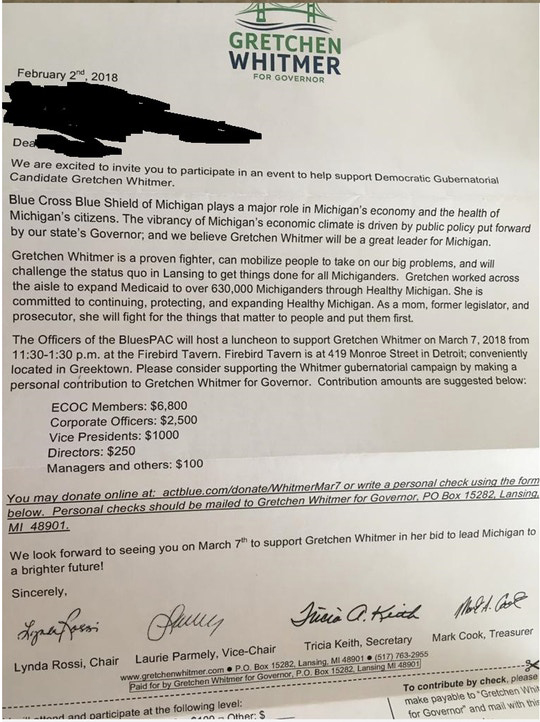
This piece is part of Fighting for Our Lives: The Movement for Medicare for All, a Truthout original series.
Often, the structural problems that keep Democrats from embracing Medicare for All are hidden beneath the political surface. This week, however, Democratic candidate for governor in Michigan Gretchen Whitmer and Blue Cross Blue Shield of Michigan offered no such subtlety. Their very public collaboration is a case study in how industry money influences campaigns and elections.
Whitmer does not support single-payer health care. She is, however, being challenged by two candidates who do: Abdul El-Sayed, and Shri Thanedar. This appears to have Blue Cross (the state’s largest insurer) nervous enough to request that its 8,100 employees support Whitmer for Governor. In a letter signed by Blue Cross executives but paid for by the Whitmer campaign, Blue Cross employees were invited to a fundraiser on March 7 and were given suggested donation amounts based on job title. Significantly, the candidate’s father, Richard Whitmer, was president of Blue Cross of Michigan for 18 years and even has a building named after him on Blue Cross’s campus.
 Screen shot of letter from Blue Cross Blue Shield of Michigan asking employees to donate to a candidate. (Image: Splinter News)
Screen shot of letter from Blue Cross Blue Shield of Michigan asking employees to donate to a candidate. (Image: Splinter News)
“This is a perfect example of how corporate politicians hold Democrats back, even as other party leaders, like Senators Cory Booker and [Kristen] Gillibrand, are calling for Medicare for All and no corporate money corrupting our politics,” said Adam Joseph, communications director for the El-Sayed campaign, in an interview with Truthout. He is referencing the two senators’ separate announcements from last week that they would reject corporate Pac money.
Indeed, in recent years progressives have become far more aware of how industry money influences policy, and the health care debate more broadly. While polls show that about 80 percent of Democratic voters support Medicare for All, only 128 of 243 Democrats in Congress (about 57 percent of the caucus) have sponsored or co-sponsored a single-payer bill in Congress. Two such bills are on the table: HR 676 in the House and Sen. Bernie Sanders’s Medicare for All in the Senate. Key leaders such as Nancy Pelosi and Chuck Schumer have not backed either proposal.
Last year, when Cory Booker voted against an amendment to allow Americans to purchase cheaper pharmaceuticals from Canada, progressives castigated him severely on social media for the money he had received from Big Pharma. In time, Booker said he would stop taking donations from Pharma and endorsed Bernie Sanders’s Medicare for All bill. So, while there is momentum for single-payer, the Democrats’ relationship with the pharmaceutical and insurance industries hurts prospects for the reform dramatically.
Single-payer has become a key issue for the Michigan race.
“A fundraising letter signed by top executives from Blue Cross Blue Shield is just another example of Gretchen Whitmer continuing to line her campaign coffers with contributions from corporate special interests and the wealthy and well-connected,” said Thanedar, in a statement provided to Truthout. “It’s further proof she’s just another career politician beholden to her career corporate donors.”
The statement also notes that “Whitmer received more than $50,000 in contributions from Blue Cross Blue Shield donors over the course of her career, including a number of years in which she held elected office.” The current CEO of Blue Cross Blue Shield Michigan, Daniel Loepp, donated $6,800 to Whitmer last year.
 Daniel Loepp, CEO of Blue Cross Blue Shield of Michigan, donates to Gretchen Whitmer. (Image: Michigan Secretary of State database)
Daniel Loepp, CEO of Blue Cross Blue Shield of Michigan, donates to Gretchen Whitmer. (Image: Michigan Secretary of State database)
When contacted by Truthout for comment, the Whitmer campaign responded by touting the candidate’s record on health care as a state legislator, without directly addressing the Blue Cross fundraiser.
“Whitmer brokered the deal with a Republican governor to expand health care to 680,000 people through Medicaid expansion because she’ll work with everyone who wants to solve problems, and take on anyone who stands in our way to increase access to quality, affordable health care for every Michigander,” Annie Ellison, Whitmer’s communications director, told Truthout.
Whitmer’s record in the state legislature does little, however, to assuage critics’ concerns about how her campaign is collaborating with Blue Cross.
“I think there is something significantly unethical [about] how a company can tell their employees who to vote for,” said Tim Lambert, a member of Physicians for a National Health Program (PNHP) of Michigan. “I don’t even understand how that is legal.”
It is legal, however, and this “employer mobilization,” is becoming an “increasing threat,” according to a 2015 American Prospect article about the trend. “Since Citizens United, companies can legally require workers to participate in politics — and fire them if they refuse,” the magazine reported.
The Prospect reports “13 percent [of workers] reported employer contacts about specific issues or political candidates,” and “7 percent of workers reported employer messages that made them uncomfortable or included threats of economic retaliation, such as job loss, changes to hours and wages, and plant closures.”
Industry Money vs. Advancing Tide of Single-Payer Support
It is telling that Michigan has two candidates who have largely embraced the Bernie Sanders model for their campaigns: progressive economic policies and small individual donations. And while Whitmer is still a heavy favorite, the 2016 election was a reminder that elections can be hard to predict.
 “At the moment, Whitmer’s most significant rival could be former Detroit Health Department executive director Abdul El-Sayed,” reported Bridge magazine, out of Michigan. “Running to Whitmer’s left, he appeals to many of the idealistic, young and college-educated progressives who gravitated to Sanders. That was reflected in an October survey of 500 University of Michigan students in which he polled at 32 percent, highest by far among the candidates for governor.”
“At the moment, Whitmer’s most significant rival could be former Detroit Health Department executive director Abdul El-Sayed,” reported Bridge magazine, out of Michigan. “Running to Whitmer’s left, he appeals to many of the idealistic, young and college-educated progressives who gravitated to Sanders. That was reflected in an October survey of 500 University of Michigan students in which he polled at 32 percent, highest by far among the candidates for governor.”
Jeff Stein at Vox did a flattering profile of the 32-year-old, who aims to be the first Muslim governor elected in the United States, and is not shy about criticizing Democrats for being too timid or conservative. He dismissed comparisons made between him and President Obama, calling Obama an advocate of “fairly centrist, middle-of-the-road Democratic policies,” rather than the transformative policies proposed by Sanders and other social democrats who seek to push the party left.
El-Sayed’s enthusiasm for a Medicare for All system is apparent in his speeches and comments. “I will drive DC to pass Medicare for All, and if they can’t, then we’ll do what it takes to achieve universal healthcare as a state,” he said after a Trumpcare vote. His policies and tactics are similar to those of Sanders, who beat Hillary Clinton in the 2016 Democratic Primary in Michigan.
As a result, single-payer has become a key issue for the Michigan race, according to local news reports and advocates who spoke with Truthout. “I think we are seeing some momentum in the state on the issue,” Lambert said. “And I think it mirrors public sentiment nationally.”
David Himmelstein, a co-founder of Physicians for a National Health Program, also suspects the industry is getting nervous about the rise of support for the policy.
“The fact that a single-payer supporter — and one who seems quite committed to the idea — is a threat to gain high office is a sign of the advancing tide of support for single payer,” Himmelstein told Truthout. “So, I think Blue Cross’s impulse to enter the arena to forestall that is a result of that advance. The money that corrupts politics is a significant problem for single-payer, but, as the Sanders campaign illustrated, not an insurmountable one.”
Join us in defending the truth before it’s too late
The future of independent journalism is uncertain, and the consequences of losing it are too grave to ignore. We have hours left to raise the $12,0000 still needed to ensure Truthout remains safe, strong, and free. Every dollar raised goes directly toward the costs of producing news you can trust.
Please give what you can — because by supporting us with a tax-deductible donation, you’re not just preserving a source of news, you’re helping to safeguard what’s left of our democracy.